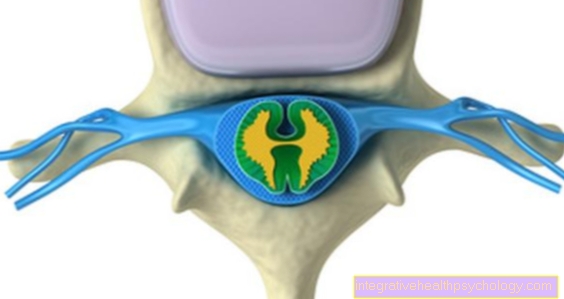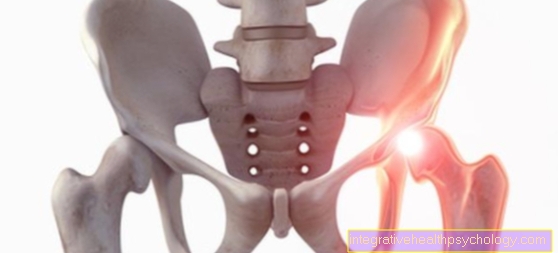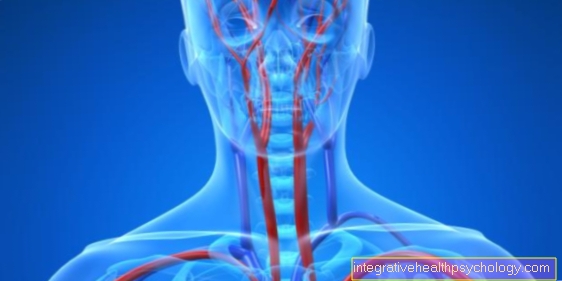Effect of beta blockers
introduction
Beta blockers are used for various heart diseases and for increased blood pressure. In addition to their effect on the heart and blood vessels, they can also influence other body functions or organs.
A beta blocker must therefore be prescribed by a doctor who, in addition to the correct dosage, also knows the mechanism of action of the preparations and can therefore choose the right drug.

Mechanism of action
Effect of beta receptors in the body
There are numerous docking points in the body that are sensitive to certain messenger substances and hormones.
If a messenger substance docks at this station, a physiological reaction is set in motion. In addition to the alpha receptors, there are also so-called beta receptors. They are located in very different organ systems in our body. Above all, they are to be found in the heart. However, these receptors can also be detected in the bronchi, uterus, adipose tissue and blood vessels.
The physiological reason is that the messenger substance that is intended for this receptor is adrenaline. This is a stress hormone that is released and has to work when the body is in a stressful or emergency situation and has to perform better than usual. An increase in blood pressure and an increase in heart rate (Pulse increase).
In emergency situations, the muscle needs more blood per minute due to the physical strain, which can only be guaranteed by increasing blood pressure and increasing heart rate. In addition to increasing blood flow, it also increases the body's consumption of oxygen. For this reason, it is necessary that the lungs can also take in more oxygen per minute. To ensure this, there are also beta receptors in the bronchi.
If adrenaline now docks at these receptors, the bronchi widen and the lungs can absorb more oxygen. In addition to the heart muscle and lungs, the beta-type receptors are also located on the blood vessels. When adrenaline is docked, there is a change in the lumen of the vascular system, which in turn has effects on blood circulation. Since beta receptors can also be found in the uterus, adrenaline, which binds to these receptors, inhibits labor. In this way, the body can accelerate or stop the birth process depending on the release of the various messenger substances. The outflow of water and thus the intraocular pressure can also be regulated via adrenaline and corresponding receptors in the area of the eye.
The aforementioned receptors are also found on the smooth vascular muscles. If adrenaline binds to it, especially in the area of the intestinal muscles, digestive processes are reduced. The background to this is that in stressful situations, as a rule, no food has to be consumed, so there is no need for digestion.
Effect of beta-receptor blockers
The processes of normal metabolism now also offer the possibility of drug intervention. You make use of the placement of the beta receptors and the corresponding effect of adrenaline on them by blocking the receptors with medication in order to achieve an opposite reaction. The so-called beta-receptor blockers, which are a separate group of drugs, enable them to attach to the corresponding receptors in the body and block them. Rushing adrenaline can no longer dock and therefore cannot develop any physiological effects.
In the heart, this means that the heart rate is reduced. The blood pressure is also lowered, although adrenaline is released in sufficient quantities. The eye pressure is lowered, and the intestinal muscles are prevented to a small extent from reducing digestive processes. During pregnancy, beta blockers would ensure that labor is increased and beta blockers prevent the bronchi from expanding the lungs (see: Beta blockers in pregnancy). As a result, asthmatics should not be given beta blockers, as this could promote shortness of breath.
Beta blockers should be dosed slowly. If the desired effect is achieved, the dose should be left in the appropriate range. It is important that abrupt discontinuation should not be performed because the body has made its receptors "more sensitive" at the time of the blockage. This means that in the absence of the blockage, the adrenaline would have a considerably stronger effect by discontinuing the drug. This would have palpitations (Tachycardia) or high blood pressure and could be dangerous.
Due to the large number of beta receptors in different organ systems, the biggest disadvantage of the beta blocker is the relatively rough adjustment option. So one can roughly say that a beta blocker blocks all receptors and also leads to corresponding, albeit unwanted, effects. Today there are also selective beta blockers that primarily affect the receptors of an organ system; but one can never completely rule out that receptors in other organs are also affected. The most common side effects of beta blockade are: tiredness, fatigue, depression, headaches and impotence. Coughing and shortness of breath can also occur but are more common if a lung disease has been described.
Effect of beta blockers specifically on the heart
Our heart is controlled by the so-called vegetative nervous system. There is the activating part, the so-called sympathetic, and the damping part, the parasympathetic. In the heart, the sympathetic nervous system works via the stress hormones adrenaline and noradrenaline, which are released during physical activity, for example, and can thus increase the heart rate, impact power and blood pressure.
However, if there is a heart disease, such as a weak heart, arrhythmia or high blood pressure, it can be helpful to reduce this increase in cardiac output so that the heart can take care of itself better and work more economically. This is where the beta blockers come into play by blocking the docking points, the so-called beta adrenoreceptors, of the stress hormones, preventing them from developing their effect.
As a result, the heart beats more slowly, i.e. the heart rate is lowered. On the one hand, this ensures that the heart can now be better supplied with oxygen. This can only happen if the heart relaxes and refills after the blood has been expelled. During this time, oxygen reaches the heart muscles via the coronary vessels. With a slowed heartbeat, this phase, the so-called diastole, now lasts longer and the oxygen supply to the heart increases.
In patients who suffer from cardiac arrhythmias, the slowed heartbeat can also help to promote the natural conduction of the heart. On the other hand, the heart now also uses less oxygen because the cardiac output has been reduced. Doctors say that the heart works more economically, i.e. more efficiently. This is especially helpful for patients with a weak heart or recurrent chest pain (Angina pectoris).
Finally, beta blockers lower blood pressure. This not only relieves the heart, as it no longer has to pump against increased resistance, but also has a positive effect on our entire body, since increased blood pressure is known to be a risk factor for many diseases such as Hardening of the arteries.
Effect of beta blockers on the psyche
The side effects of beta blockers on mental health have been discussed for a long time. The study situation contradicts each other on this topic and the specialists seem to disagree. It is said that patients who take beta blockers have an increased risk of developing depression.
This is countered by studies that formed two patient groups and only one group received the beta blocker, the other group, however, received a tablet without active ingredient (placebo). This showed that there was no clear difference between the two test groups and, in this case, even fewer patients in the beta blocker group suffered from depression than in the comparison group.
Accordingly, the effect of beta blockers on the psyche has not been conclusively clarified.
Duration of action
There are several beta blockers on the market that vary in how long they work. In pharmacy one speaks of the half-life, it describes the period in which half of the drug was broken down in our body and is therefore a measure of the duration of action. The half-life of the various beta blockers ranges from 3-4h (Metoprolol) up to 24h (Nevibolol).
This is also the reason why metoprolol is often given twice a day. This does not mean that the effect of metoprolol is over after 4 hours, but only that 50% of the active ingredient has already been eliminated.
After another 4 hours, only 25% are left, etc., i.e. that the effect does not stop suddenly but slowly creeps up.
Can beta blockers be used for anxiety?
If a person is afraid, the autonomic nervous system is excited. The so-called sympathetic nervous system makes people ready to flee. The heart rate rises, the muscles are better supplied with blood, and you start to sweat. The stress hormones adrenaline and noradrenaline are responsible for this. As already mentioned, beta blockers block the docking points for these stress hormones and reduce the effect of the sympathetic nervous system.
Psychiatrists also make use of this effect in the therapy of anxiety and anxiety disorders. This does not remove the fear itself, it requires further psychotherapy, but it alleviates the physical symptoms of the fear.
Beta blockers are not suitable as long-term therapy, but can be used for stressful situations such as Exams are prescribed.





























